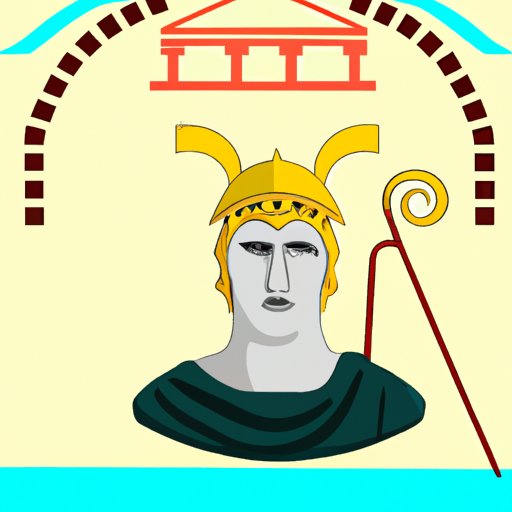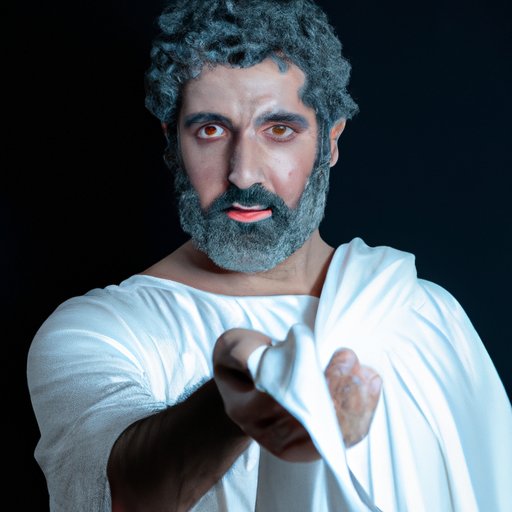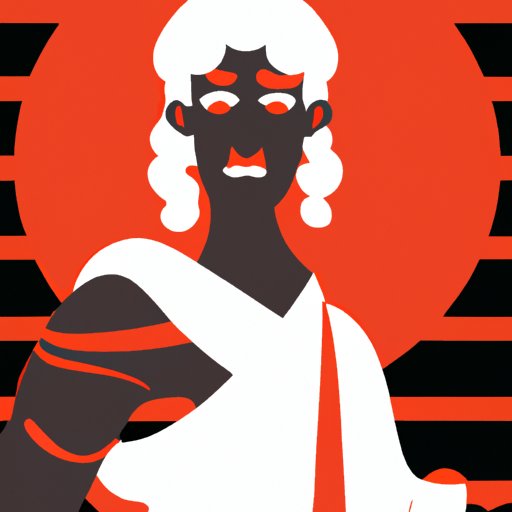Introduction
The Greek god of theater is a figure of immense importance in the pantheon of Greek gods and goddesses. This powerful deity has been worshipped for centuries and has had a profound impact on the development of theatrical performance throughout the ages. In this article, we will explore the history and symbolism of the Greek god of theater and examine how it has influenced later forms of dramatic performance.

A Historical Overview of the Greek God of Theater
The Greek god of theater is known by many names, including Dionysus, Bacchus, and Zagreus. According to legend, Dionysus was born from the union of Zeus and Semele, a mortal woman. He was then raised by the nymphs on Mount Nysa, where he discovered the secrets of wine-making and the power of intoxication. As a result, Dionysus became associated with the cultivation of grapes and the production of wine.
The mythology surrounding Dionysus evolved over time. In some accounts, he is described as a fertility god who presides over vegetation and animal life. In other stories, he is depicted as a wild and untamed god who leads his followers in ecstatic revelries. Regardless of the specific version of the myth, Dionysus is consistently portrayed as a powerful deity who is closely linked with wine and intoxication.
Exploring the Significance of the Greek God of Theater in Ancient Mythology
In ancient Greek mythology, Dionysus is often associated with ritualistic activities and festivals. He is believed to have presided over the Thesmophoria, a festival for women that celebrated fertility and the cycle of life. He was also thought to be connected to the Anthesteria, a three-day festival during which offerings were made to the dead and prayers were said for the protection of crops. Additionally, Dionysus was venerated at the Dionysia, a large festival dedicated to the god and his cult.
The symbolism associated with Dionysus is varied and complex. He is often represented as a bearded man wearing a crown of ivy and holding a thyrsus, a staff entwined with ivy and grape leaves. His symbols are deeply intertwined with those of wine, fertility, and rebirth. In some depictions, Dionysus is shown riding a chariot drawn by panthers, a symbol of his wild and untamed nature.

The Role of the Greek God of Theater in Ancient Greek Plays and Festivals
The Greek god of theater had a profound influence on the development of early forms of dramatic performance. Many of the earliest surviving plays feature Dionysus as a primary character. For example, in Euripides’ “The Bacchae,” Dionysus appears as a central figure and is responsible for leading his followers in ecstatic revelry. Similarly, in Sophocles’ “Antigone,” Dionysus is portrayed as a powerful god who brings chaos and destruction to those who oppose him.
The influence of Dionysus on the early forms of dramatic performance is evident in the festivals dedicated to him, such as the Dionysia. During these festivals, plays were performed in honor of Dionysus and his cult. These performances typically featured music, dance, and poetry, and were meant to invoke the god’s presence. By honoring Dionysus through these theatrical performances, the Greeks hoped to receive his favor and blessings.
How the Greek God of Theater Influenced Later Forms of Dramatic Performance
The influence of the Greek god of theater is still felt in modern theater productions. Many later forms of dramatic performance, including opera and musical theater, owe their existence to the legacy of Dionysus. For example, the use of music and dance in operas can be traced back to the Dionysian festivals, where music and dance were used to invoke the god’s presence.
In addition, modern theater productions often incorporate elements of Dionysian mythology, such as the use of masks, costumes, and props. These elements help to create a sense of mystery and intrigue and encourage viewers to explore the deeper themes and meanings of the performance. By incorporating these elements, modern theater productions are able to evoke the spirit of Dionysus and pay homage to the Greek god of theater.

An Analysis of the Symbolism Associated with the Greek God of Theater
The symbols associated with Dionysus are rich and varied. He is often represented as a bearded man wearing a crown of ivy and holding a thyrsus, a staff entwined with ivy and grape leaves. This imagery is closely linked to his association with wine, fertility, and rebirth. Other symbols associated with Dionysus include the panther, a symbol of his untamed and wild nature; the bull, a symbol of strength and power; and the pine tree, a symbol of eternal life.
Dionysus is also closely linked to other deities in Greek mythology, such as Demeter, the goddess of the harvest, and Apollo, the god of music and the arts. These associations further emphasize the importance of Dionysus in the pantheon of Greek gods and goddesses. By examining the symbolism associated with Dionysus, we can gain insight into the significance of the Greek god of theater in ancient mythology.
Conclusion
The Greek god of theater is a powerful figure in the pantheon of Greek gods and goddesses. He is closely associated with wine, fertility, and rebirth and is believed to have presided over the Thesmophoria, the Anthesteria, and the Dionysia festivals. Through their theatrical performances, the Greeks honored Dionysus and sought to receive his favor and blessings.
The mythology and symbolism associated with Dionysus have had a profound impact on later forms of dramatic performance, including opera and musical theater. Modern theater productions often incorporate elements of Dionysian mythology, such as masks, costumes, and props, in order to evoke the spirit of Dionysus and pay homage to the Greek god of theater. By exploring the history and symbolism of the Greek god of theater, we can gain a better understanding of its influence on later forms of dramatic performance.
(Note: Is this article not meeting your expectations? Do you have knowledge or insights to share? Unlock new opportunities and expand your reach by joining our authors team. Click Registration to join us and share your expertise with our readers.)
